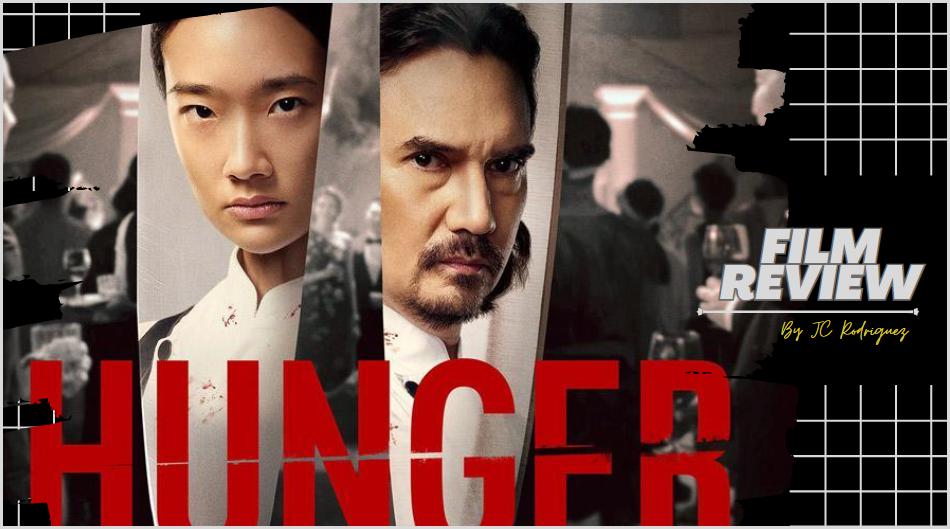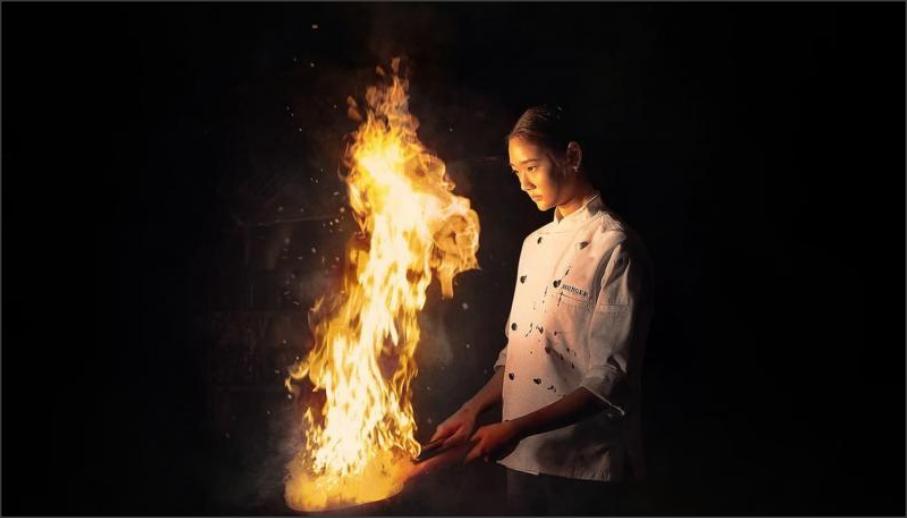Food, chef, wealthy people. Another film that deals with the theme of haute cuisine and social classes. The main attraction for me is that it is a Thai film.
Comida, chef, gente adinerada. Otra película que trata el tema de la alta cocina y las clases sociales. El mayor atractivo para mí es que se trata de una película tailandesa.

Source _ Edited in Canva.com & Photoshop

**I still have the good taste in my mouth from the last film that dealt with similar themes. The Menu, which I already reviewed. Also, the trailer for Hunger was intriguing enough to convince me to seek it out on Netflix and watch it.**
As the trailer hints at, we will witness a showdown. On one side, we have Aoy, a young woman, the eldest daughter who must take over a low-end food business owned by her family, food for the common folk, but has great potential to become a renowned chef.
Her nemesis is Chef Paul, a celebrity, the richest and most powerful people in her country hire him to prepare their dishes for them at the most exclusive parties. Being part of his team of chefs is a privilege, not suitable for everyone, because Chef Paul is extremely demanding, his food is to satisfy those who can afford it and he is a total dictator in his kingdom, where he prepares his culinary masterpieces.
Similarly, at the beginning of the film there is another very marked confrontation in the plot, the film puts a lot of emphasis on the class difference. The opening sequence makes clear the intentions of the film, with those rich people grotesquely devouring the dish served to them by Chef Paul. The director establishes the differences, between the devourers and those who must watch from a distance, those who are there to serve them and with no possibility of being like them.
Throughout the film we are emphasized the constant class difference, how the poor are the ones who make sacrifices, they are good people. While the rich are bad, they live in their world of privilege, they don't care about anything, they only care about satisfying their ego, their vanity. In the end, the message of the film seems too leftist for my taste. I kept watching it, because up to a certain point of the movie it was quite entertaining.
----
> **Todavía tengo el buen sabor de boca que me dejó la última película que trataba temas similares. The Menu, que ya reseñé. Además, el tráiler de Hunger era lo suficientemente intrigante como para convencerme de buscarla en Netflix y verla.**
> Como insinúa el tráiler, seremos testigos de un enfrentamiento. Por un lado, tenemos a Aoy, una mujer joven, la hija mayor que debe hacerse cargo de un negocio de comida de gama baja propiedad de su familia, comida para la gente comun, pero tiene un gran potencial para convertirse en una cocinera de renombre.
> Su némesis es el chef Paul, toda una celebridad, las personas más ricas y poderosas de su país le contratan para que les prepare sus platos en las fiestas más exclusivas. Formar parte de su equipo de cocineros es un privilegio, no apto para cualquiera, porque el Chef Paul es extremadamente exigente, su comida es para satisfacer a los que se lo pueden permitir y es un dictador total en su reino, allí donde prepara sus obras maestras culinarias.
> Del mismo modo, al principio de la película hay otro enfrentamiento muy marcado en la trama, la película hace mucho hincapié en la diferencia de clases. La secuencia inicial deja claras las intenciones de la película, con esos ricos devorando grotescamente el plato que les sirve el chef Paul. El director establece las diferencias, entre los devoradores y los que deben mirar desde la distancia, los que están allí para servirles y sin posibilidad de ser como ellos.
> A lo largo de la película se nos recalca la constante diferencia de clases, como los pobres son los que hacen sacrificios, son buenas personas. Mientras que los ricos son malos, viven en su mundo de privilegios, no les importa nada, solo les importa satisfacer su ego, su vanidad. Al final, el mensaje de la película me parece demasiado izquierdista para mi gusto. Seguí viéndola, porque hasta cierto punto de la película era bastante entretenida.



*Poor people eat to satisfy their hunger, but when you have everything, the hunger never ends, you want more.* A similar phrase is what Chef Paul says to Aoy. A phrase that has a lot of truth in it.
**We eat to satisfy our hunger, we need to feed ourselves, maybe we have some privilege to better select our food, maintain a healthy diet, we are not rich, but we allow ourselves to enjoy the taste of food, but we must not forget that there are people with fewer resources and very hungry, so hungry that they just gobble, everything they can eat will seem rich to them, because their primary need to feed themselves is very great.** They are not concerned about who made the food, if it is aesthetically pleasing, if the ingredients are of quality, not at all, they just want to eat to continue living.
Now, for the more privileged social group, all their needs are met, their hunger is different. It is hunger to feel powerful, it is hunger for their ego, the desire to be flattered, to be recognized, to be pleased. It is the most voracious hunger, because it is never satiated, when they get something exclusive, they want more, much more. That's why they are able to spend a fortune on food prepared by a chef and his team, who have been elevated to star status by those same people who need idols to worship.
Chef Paul was my favorite character. His way of being was justified by a childhood trauma, something that scarred him for life. He knows that the people he serves would eat his excrement, because that's what caviar tastes like when he first tasted it. The humiliation and subsequent need for revenge is what leads him to learn the rules of the game, to study the behavior of the privileged, to know what they want, to give them what they crave so that they remain enraptured in their own vanity. Chef Paul enjoys seeing how everyone is ecstatic to taste his dishes, he takes pleasure in watching them eat, every bite they take, they are satiating the Chef's hunger for manipulation and control.
The Chef to me is justified in his attitude, but the story is very moralistic, so the viewer will easily stigmatize him as the villain, regardless of whether his background is similar to the other protagonist. His teaching and training methods seem like torture, but it's just that if you want to be as successful as he is, it won't be easy. It reminded me of the movie Whiplash, which received a lot of criticism at the time, because of the way one of its characters teaches, so many viewers today will see Chef Paul as a monster, because they are the type who believe they should be treated like children, when they are already adults and must face the world, which is not flattering at all. A lot of sensitive people today, who wouldn't stand five minutes with a Chef Paul style mentor.
The heroine of this story is Aoy. She is hungry to be special, to leave poverty behind and become everything she has dreamed of. Her character reminded me of all those self-centered people eager for fame, who are not prepared to assimilate all the negative that comes with it. Of course, being the good one in the story, she is the moral compass, from her point of view we will enter that world of luxury, full of corruption and injustice. For a moment she will become one more idol, she will get to taste the delicious dish of fame and power. I was waiting impatiently for his total transformation, but it is here where the story ends up getting lost in its own plot, with an overly moralistic message.
---
---
> *Los Pobres comen para saciar el hambre, pero cuando lo tienes todo, el hambre nunca se acaba, quieres más.* Una frase parecida es la que le dice el Chef Paul a Aoy. Una frase que tiene mucho de verdad.
> **Comemos para saciar el hambre, necesitamos alimentarnos, quizás tenemos algún privilegio para seleccionar mejor nuestros alimentos, mantener una dieta sana, no somos ricos, pero nos permitimos disfrutar del sabor de la comida, pero no debemos olvidar que hay personas con menos recursos y con mucha hambre, tanta hambre que solo engullen, todo lo que puedan comer les parecerá rico, porque su necesidad primaria de alimentarse es muy grande.** No les preocupa quién ha hecho la comida, si es estéticamente agradable, si los ingredientes son de calidad, en absoluto, sólo quieren comer para seguir viviendo.
> Ahora, para el grupo social más privilegiado, todas sus necesidades están cubiertas, su hambre es diferente. Es hambre de sentirse poderoso, es hambre de su ego, el deseo de ser halagado, de ser reconocido, de ser complacido. Es el hambre más voraz, porque nunca se sacia, cuando obtienen algo exclusivo, quieren más, mucho más. Por eso son capaces de gastarse una fortuna en comida elaborada por un chef y su equipo, que ha sido elevado a la categoría de estrella por esas mismas personas que necesitan ídolos a los que adorar.
> El chef Paul era mi personaje favorito. Su forma de ser se justifica por un trauma infantil, algo que le marcó de por vida. El sabe que esa gente a la que les sirve, se comería hasta los excrementos, porque a eso le sabe el caviar cuando lo probo por primera vez. La humillación y posterior necesidad de venganza es lo que le lleva a aprender las reglas del juego, a estudiar el comportamiento de los privilegiados, a saber lo que quieren, a darles lo que anhelan para que sigan embelesados en su propia vanidad. El Chef Paul disfruta viendo como todos se extasían al probar sus platos, siente placer al verlos comer, cada bocado que dan, están saciando el hambre de manipulación y control del Chef .
> El Chef para mí está justificado en su actitud, pero la historia es muy moralista, por lo que el espectador lo estigmatizará fácilmente como el villano, independientemente de que su origen sea similar al del otro protagonista. Sus métodos de enseñanza y entrenamiento parecen una tortura, pero es que si quieres tener tanto éxito como él, no será fácil. Me recordó a la película Whiplash, que recibió muchas críticas en su momento, por la forma de enseñar de uno de sus personajes, por lo que muchos espectadores de hoy verán al Chef Paul como un monstruo, porque son de los que creen que deben ser tratados como niños, cuando ya son adultos y deben enfrentarse al mundo, que no es nada halagüeño. Mucha gente sensible hoy en día, que no aguantaría ni cinco minutos con un mentor al estilo Chef Paul.
> La heroína de esta historia es Aoy. Tiene hambre de ser especial, de dejar atrás la pobreza y convertirse en todo lo que ha soñado. Su carácter me recordó a todas esas personas egocéntricas ansiosas de fama, que no están preparadas para asimilar todo lo negativo que viene con ella. Por supuesto, al ser la buena de la historia, ella es la brújula moral, desde su punto de vista nos adentraremos en ese mundo de lujo, lleno de corrupción e injusticia. Por un momento se convertirá en un ídolo más, llegará a probar el delicioso plato de la fama y el poder. Esperaba con impaciencia su transformación total, pero es aquí donde la historia acaba perdiéndose en su propia trama, con un mensaje demasiado moralista.

